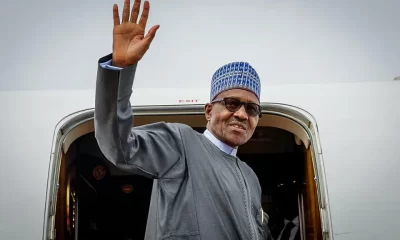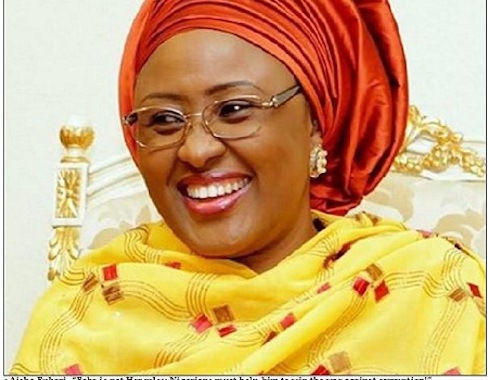Economy
Buhari Constitutes Committee to Assess COVID-19 Effect on Economy

By Mathew Dadiya, Abuja
In a prompt effort to curtail the impact of the COVID-19 otherwise known as Coronavirus on the Nigerian economy with the plunge in the global oil prices from $53 last week to $35, President Muhammadu Buhari has constituted an economic committee to review the oil benchmark in the 2020 budget.
The committee which is chaired by the Minister of Finance, Budget and National Planning, Mrs Ahmed had the Minister of State, Petroleum Resources, Timipre Sylva, Minister of State, Budget and National Planning, Prince Clement Agba, Governor of the Central Bank of Nigeria (CBN), Godwin Emefiele and the Group Managing Director of Nigeria National Petroleum Corporation (NNPC), Mela Kyari as members.
Speaking with State House correspondents on Monday, after meeting with President Buhari at the President Villa, Abuja, the Minister of Finance, Budget and National Planning disclosed that the committee would review the $57 crude oil price benchmark in the budget and might reduce the 2020 budget.
She said: “Mr. President has formed us into a committee with the minister of State, Petroleum Resources, the Central Bank governor, GMD NNPC and myself as members.
“Our mandate is to make a very quick assessment of the impact of this coronavirus on the economy especially as it effects the crude oil price.
“We will be writing a report and brief Mr. President tomorrow (Tuesday) or Wednesday morning. After that we will also have more substantial information for the press.
“It is very clear that we will have to revisit crude oil benchmark price that we have of $57 per barrel. We have to revisit it and lower the price. Where it will be lowered is the subject of this committee. What the impact will be on that is that there will be reduce revenue to the budget at it will cut the size of the budget. The quantum of the cut is what we are supposed to assess as a committee.”
Asked if Nigeria intends to dialogue with Russia and other OPEC+ members to cutdown oil output, the Minister of State Petroleum, Timipre Sylva, said, “we as a member of OPEC are not in a position to take that engagement on our own unilaterally. There was a disagreement between OPEC and OPEC+, it’s not just Russia, but the biggest producers within OPEC and OPEC+ which are Saudi Arabia and Russia.
“We believe that in the coming days when all of us would have begun to see effect of the reduction of prices, OPEC and OPEC+ might need to meet again and reconsider our positions.
Meanwhile, Sylva said that they expected also that a lot of discussions were going on at the level of Saudi Arabia and Russia, but as Nigeria, “we are not in a position to begin to engage members on this matter.”
Oil prices suffered their biggest fall since the day in 1991 when American forces launched air strikes on Iraqi troops following their invasion of Kuwait.
Monday’s crash spooked markets crash that were already freaking out about the impact of the coronavirus pandemic on the global economy and demand for oil. Brent crude futures, the global oil benchmark, were down 22%, last trading at $35.45 per barrel. US oil is trading at $33.15 per barrel, a decline of nearly 20%
Here are five things you need to know:
Why are oil prices crashing?
Saudi Arabia, the world’s top exporter, launched a price war over the weekend. The move followed the imposition of an alliance between the OPEC cartel, led by Saudi Arabia, and Russia.
The kingdom and Russia came together to form the so-called OPEC+ alliance in 2016 after oil prices plunged to $30 a barrel. Since then, the two leading exporters have orchestrated supply cuts of 2.1 million barrels per day. Saudi Arabia wanted to increase that number to 3.6 million barrels through 2020 to take account of weaker consumption.
But Russian President Vladimir Putin, worried about ceding too much ground to American oil producers, refused to go along with the plan and his energy minister, Alexander Novak on Friday signaled a fierce battle to come for market share when he said countries could produce as much as they please from April 1.
Why did Saudi launch a price war?
Simmering differences over how best to manage global oil markets spilled into the open at a meeting between OPEC and Russia in Vienna on Friday.
CNN Business quoted sources as saying that after Russia said it was ditching the alliance, Saudi Arabia warned it would live to regret the decision.
Moscow had become tired of cutting production to stabilize prices and felt that the policy of supply restraint gave more room for US shale companies to grow. Mikhail Leontiev, a spokesperson for Russian state oil company Rosneft, described the OPEC+ deal as “masochism.”
“By yielding our own markets, we remove cheap Arab and Russian oil to clear a place for expensive US shale oil and ensure the effectiveness of its production,” he told Russian state media on Sunday.
America has become the number one oil producer in the world and is expected to pump about 13 million barrels a day in the first quarter of this year.
Over the weekend, Saudi Arabia decided to fight for greater market share by slashing the prices its preferred customers pay by between $4-$7 a barrel. The kingdom is also reportedly planning to lift production to over 10 million barrels a day.
What does coronavirus have to do with all of this?
The coronavirus has undermined energy demand worldwide, but especially in China, which is now the number one importer of crude oil, guzzling roughly 10 million barrels a day.
Economy
SEC Advocates Advanced Financial Inclusion by 2030

By Tony Obiechina, Abuja
The Securities and Exchange Commission (SEC) has stressed the need for Nigeria to harness its demographic dividend to advance financial inclusion through investments by 2030 for national survival or face deepening inequality.
The Director-General of the SEC, Dr Emomotimi Agama said this at the United Capital Asset Management Investment forum on Wednesday in Lagos.
Agama, in his keynote address titled: “Advancing Financial Inclusion through Investments: Bridging
Nigeria’s Knowledge and Wealth Gap,” said Nigeria must harness its demographic dividend to boost investment.
“Our theme, Advancing Financial Inclusion through Investments, is not aspirational; it is foundational to national survival.
“We stand at a pivotal moment. By 2030, Nigeria can either harness its demographic dividend or face deepening inequality. The knowledge-wealth gap is not merely an economic challenge; it is a moral imperative,” Agama said.
He said the term inclusion should be reframed as active financial involvement, where access meets empowerment, and capital becomes a tool for transformation.
Agama said that closing the financial inclusion gender gap could lift 700,000 Nigerians from poverty.
He said, “Nigeria has a great population yet we have a tiny drop of this number of persons involved in the capital market.
“That one reason for poverty, because we are running from money. We have to do something. Our market capitalisation is an opportunity to do something,
We all have
“We need to change the narrative and move the market forward. We must reach out to make the difference. We are committed to protecting investors and developing the market. Our goal is to do the right thing no matter whose ox is gored. We will work by the principles of fairness and equity to change the market. We will provide a fair ground for everyone to aspire.
He noted that MTN Nigeria’s share offering drew 150,000 new investors – 75 per cent women, 85 per cent under 40.
Agama recommended a four-pillar strategy for bridging the gaps.
He listed the four-pillar strategy as democratisation of financial knowledge, catalyse MSME Investment Channels, blended Finance Vehicles: Partner with Bank of Industry (BOI) to de-risk loans for women-led SMEs.
“We need to educate people about finances. As we drive this market, we do so for a purpose, I enjoin everyone to be the disciple and the apostles. Getting this market to move is a deliberate action,” he added.
| ReplyReply allForwardAdd reaction |
Economy
NPA Assures of Over N1.27trn Revenue in 2025

By Ubong Ukpong, Abuja
The Nigerian Ports Authority (NPA) on Monday assured that it would take into the coffers massive revenue of over N1.27 trillion in 2025, representing a 40 percent increase from the N894.86 billion it realized in 2024.
This ambitious target, the Authority said, was anchored on sweeping modernization efforts, the full activation of the Dangote Refinery’s marine operations, and the deployment of cutting-edge technology to enhance port efficiency.
Managing Director of the NPA, Abubakar Dantsoho, disclosed this in a presentation during his agency’s budget defence session wih the House of Representatives Committee on Ports and Harbours, where he defended the agency’s 2025 budget estimates and provided insights into its 2024 performance.
“Our 2025 budget proposal is more than figures, it reflects our aspirations for a more efficient, globally competitive port system,” Dantsoho told lawmakers, adding that over 70% of the proposed expenditure will go into capital projects.
For 2024, the Authority surpassed its revenue target of N865.39 billion, posting an actual realization of N894.86 billion.
However, Dantsoho revealed that only N417.86 billion, less than half of the approved N850.92 billion expenditure, had been spent as of the time of reporting.
Despite this, NPA made a record contribution of N400.8 billion to the Consolidated Revenue Fund (CRF) in 2024, nearly double the N213.23 billion remitted in 2023. Of this amount, a staggering N344.7 billion was deducted at source.
“This shows our unwavering commitment to national revenue generation, even when our own operational liquidity is affected,” the NPA boss stressed.
Dantsoho said the projected revenue increase is premised on several key assumptions and developments, including: The full operation of the Dangote Refinery, which alone is expected to draw in over 600 vessels annually through its Single Point Mooring (SPM) system; the commissioning of upgraded terminals at WACT and OMT, which will enhance container traffic; the implementation of automation tools such as the National Single Window, Port Community System (PCS), and Vessel Traffic Management System (VTMS); and increased cargo volumes stemming from global disruptions, including the Russia-Ukraine conflict, which has affected global trade routes.
He said the 2025 revenue is expected to come from the following key sources: Ship Dues, N544.06 billion; Cargo Dues, N413.06 billion; Concession Fees, N249.69 billion; and Administrative Revenue, N73.07 billion
Of the proposed N1.14 trillion total expenditure for 2025, N778.46 billion is earmarked for capital projects.
This investment, he said, will target the revitalization of critical infrastructure, including the Calabar, Warri, and Burutu ports and channels, and enhance towage services, channel depth, and compliance with international security conventions.
“Investments in infrastructure and technology are non-negotiable if we are to stay competitive regionally and globally,” Dantsoho emphasized.
He cited increasing competition from neighboring ports and aging assets across Nigeria’s coastal corridors.
The NPA also intends to address technology gaps by upgrading legacy systems and bolstering cybersecurity, ensuring Nigerian ports meet global standards for digital operations.
“We can say that with timely access to internally generated revenue and capital funds NPA would deliver the kind of impact Nigeria expects,” he said.
Chairman of the Committee, Hon. Nnolim Nnaji, urged the NPA to ramp up performance, improve port infrastructure, and play a greater role in addressing Nigeria’s revenue and unemployment challenges.
Nnaji said the ports remain a critical pillar of Nigeria’s economy, and urged the agency to meet rising expectations despite operational challenges.
“No country can thrive economically without high-performing ports. They are the economic heartbeat of every nation, determining how buoyant a country is through the flow of imports and exports,” Hon Nnaji said.
The committee praised NPA for its performance.
Nnaji stressed that the NPA’s performance has implications beyond maritime activity, noting that increased port output can significantly boost job creation across several sectors.
“The Nigerian Ports Authority is not just a revenue-generating agency, it is a national asset in terms of employment and economic impact.
“We expect to see detailed strategies on how to improve revenue generation and expand employment opportunities through your 2025 budget,” he said.
The lawmaker also pointed to growing interest in the development of new ports across the country but cautioned against neglecting existing port infrastructure.
“As we welcome investment in new ports, we must not abandon the old ones. Maintaining and upgrading our existing ports, both in the Eastern Corridor and the Western axis, is essential to long-term sustainability,” he added.
The Committee called for a clear outline from the NPA on how its 2025 financial plan will address pressing national concerns and reaffirm Nigeria’s competitiveness in regional and global maritime trade.
Economy
Senate Sets N10trn Revenue Target for NCS, Urges Agency to Curb Smuggling, Illicit Drugs

By Eze Okechukwu, Abuja
The Senate, through its Committee on Customs has set a revenue target of N10 trillion for the Nigeria Customs Service for the 2025 fiscal year, instead of the initial N6.584 trillion given to her earlier on while urging the agency to clamp down on smuggling and Illicit drugs.
The Chairman of the Committee, Senator Isah Jibrin (Kogi East), who gave the agency the marching order yesterday in Abuja during the budget defence of the revenue driving agency however commended her for exceeding its 2024 revenue target of N5.
079 trillion.The NCS team led by Deputy Comptroller General, Jibo Bello who represented the Comptroller General presented the 2024 budget performance with a revenue target of N5.
079 trillion, stressing that the proposal was exceeded by over a trillion naira.The Committee, obviously impressed by the performance commended NCS before asking them to go ahead and present the 2025 budget proposal, which the agency tied at N6.584 trillion revenue target with an expenditure of N1.132 trillion.
Following their presentation, members of the Senate Committee on Customs unanimously approved the recommendation of the revenue target of N6.584 trillion and the expenditure of N1.132 trillion for the 2025 financial year.
The Committee will subsequently present the budget proposal to the Senate at plenary most likely this week as the red chamber resumes today after a long recess tied to Eid celebration.
In his final remarks, Senator Jibrin emphasised the need for the NCS to rise up in terms of its surveillance with respect to illicit drugs and smuggling “to ensure that, as much as possible, you should be on top of your game”.
He said there are so many illicit drugs flowing all over the place, which according to him “is contributing to the issue of banditry in Nigeria because most of these guys are on drugs. What I’m saying is that, in addition to your revenue drives, you should also be mindful of some of these other functions.




























